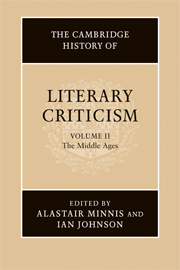Book contents
- Frontmatter
- Introduction
- I THE LIBERAL ARTS AND THE ARTS OF LATIN TEXTUALITY
- II THE STUDY OF CLASSICAL AUTHORS
- III TEXTUAL PSYCHOLOGIES: IMAGINATION, MEMORY, PLEASURE
- IV VERNACULAR CRITICAL TRADITIONS: THE EARLY MIDDLE AGES
- V VERNACULAR CRITICAL TRADITIONS: THE LATE MIDDLE AGES
- VI LATIN AND VERNACULAR IN ITALIAN LITERARY THEORY
- VII BYZANTINE LITERARY THEORY AND CRITICISM
- Bibliography
- Index
- References
Introduction
Published online by Cambridge University Press: 28 March 2008
- Frontmatter
- Introduction
- I THE LIBERAL ARTS AND THE ARTS OF LATIN TEXTUALITY
- II THE STUDY OF CLASSICAL AUTHORS
- III TEXTUAL PSYCHOLOGIES: IMAGINATION, MEMORY, PLEASURE
- IV VERNACULAR CRITICAL TRADITIONS: THE EARLY MIDDLE AGES
- V VERNACULAR CRITICAL TRADITIONS: THE LATE MIDDLE AGES
- VI LATIN AND VERNACULAR IN ITALIAN LITERARY THEORY
- VII BYZANTINE LITERARY THEORY AND CRITICISM
- Bibliography
- Index
- References
Summary
This is the first general history of medieval literary theory and criticism. It has been achieved through a long process of selection and compromise. When the project originally was conceived, we did not know (we could not have known then) what quantity and quality of materials awaited us, what would happen when scholars from a wide range of disciplines, segregated within the modern academy, would come together and pool their expertise – and, indeed, be encouraged to work on materials which had hitherto been ignored, or unexplored from the perspective of literary theory and criticism.
For a long time this subject has suffered from a refusal to believe in its very existence. George Saintsbury, in his History of Criticism and Literary Taste in Europe (1900–4), declared that ‘the Middle Ages were … certainly not Ages of Criticism’; ‘their very essence was opposed to criticism in any prevalence’ (I, p. 373). Writing some forty years later, in his English Literary Criticism: The Medieval Phase, J. W. H. Atkins challenged Saintsbury's claim, yet supposed that the period was ‘one of confused thinking in literary matters’ (p. 3). The 1957 short history of literary criticism by W. K. Wimsatt and Cleanth Brooks felt obliged to seek aesthetic, rather than distinctively literary, theory in the Middle Ages, and came away disappointed that ‘no new theory of beauty, of fine art in general, or of poetry’ is offered by St Thomas Aquinas or ‘other theologians of the high Middle Ages’ (p. 126). Giovanni Boccaccio's account of poetics in his Genealogy of the Gentile Gods is, however, given honourable mention.
- Type
- Chapter
- Information
- The Cambridge History of Literary Criticism , pp. 1 - 12Publisher: Cambridge University PressPrint publication year: 2005
References
- 1
- Cited by

